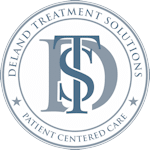Treating co-occurring substance use disorders and mental health conditions requires an integrated and comprehensive approach that addresses both the substance use disorder and the underlying mental health issues.
At DeLand Treatment Solutions, our approach incorporates various treatment modalities, including GeneSight testing, Medication Management, Acceptance and Commitment Therapy (ACT), and Medication-Assisted Treatment (MAT).
Below is an overview of our treatment approach for co-occurring substance use disorders:
Co-Occurring Mental Health Disorder Treatment Approaches
GeneSight Testing
GeneSight testing provides valuable insights into an individual’s genetic predisposition and how they might respond to certain medications.
This information helps inform our psychiatrist and psychiatric nurse practitioner when making medication selections and dosage adjustments.
In addition, this tool allows us to reduce the risk of adverse reactions and increase the likelihood of finding an effective medication for both the substance use disorder and any co-occurring mental health conditions.
Medication-Assisted Treatment (MAT):
Medication management is essential in addressing the physical and psychological aspects of substance use disorders. Medications can help manage withdrawal symptoms, reduce cravings, and stabilize moods, facilitating the recovery process.
Commonly used medications include those for opioid use disorder, alcohol use disorder, and other substance-related disorders. Our team regularly monitors and adjusts medications based on the individual’s progress and response to treatment.
Acceptance and Commitment Therapy (ACT):
ACT helps the individual develop mindfulness skills, increase psychological flexibility, and enhance their ability to cope with cravings, triggers, and difficult emotions.
It encourages acceptance of unwanted thoughts and feelings while promoting commitment to behavior change aligned with personal values and goals. ACT is an effective part of a comprehensive treatment plan for co-occurring substance use and mental health disorders.
Behavioral Therapies and Counseling:
Evidence-based behavioral therapies, such as cognitive-behavioral therapy (CBT), motivational interviewing (MI), and contingency management are beneficial when addressing the cognitive and behavioral aspects of substance use disorders.
These therapies help individuals identify and change harmful thought patterns, develop coping skills, and foster motivation for recovery.
Daily Individual Therapy:
Individual therapy allows for a more personalized and focused approach to address the specific challenges and needs of individuals with co-occurring disorders.
Therapists can help clients explore the connections between their substance use and mental health symptoms, identify triggers, and develop coping strategies to manage cravings, triggers, and emotional distress.
Daily Group Therapy:
Group therapy provides a supportive and non-judgmental environment where individuals can share their experiences, learn from others, and receive encouragement from peers who can relate to their struggles. It fosters a sense of belonging and helps individuals realize that they are not alone in their journey to recovery.
Group therapy focuses on skill-building activities, such as communication skills, stress management techniques, and relapse prevention strategies. These skills can be learned and practiced within the group setting, allowing individuals to gain practical tools for managing their substance use and mental health symptoms.
Group therapy encourages social interaction and the development of healthy relationships. It can help individuals improve their interpersonal skills, build a support network, and experience the benefits of mutual support and empathy from others facing similar challenges.
Integrating both group and individual therapy offers a comprehensive and holistic treatment experience for individuals with co-occurring substance use and mental health disorders.
A well-designed treatment plan should consider the unique needs and preferences of each individual, ensuring that they receive the necessary support and guidance to achieve lasting recovery and improved overall well-being.
Comprehensive Aftercare Planning:
Throughout an individual’s stay, our team will be developing a comprehensive aftercare plan that includes ongoing support, relapse prevention strategies, and access to community resources—setting each person up to succeed at maintaining long-term recovery.
Co-Occurring Disorder Facts & Statistics
- 1 in 5 U.S. adults experiences mental illness each year.
- 1 in 20 U.S. adults experiences serious mental illness each year.
- 1 in 6 U.S. youth aged 6-17 experience a mental health disorder each year.
- 50% of all lifetime mental illness begins by age 14, and 75% by age 24.
- Suicide is the 2nd leading cause of death among people aged 10-34. 21% of U.S. adults experienced mental illness in 2020 (52.9 million people). This represents 1 in 5 adults.
- 5.6% of U.S. adults experienced serious mental illness in 2020 (14.2 million people). This represents 1 in 20 adults.
- 6.7% of U.S. adults experienced a co-occurring substance abuse disorder and mental illness in 2020 (17 million people).
- 46.2% of U.S. adults with mental illness received treatment in 2020.
- 64.5% of U.S. adults with serious mental illness received treatment in 2020.
Co-occurring disorders impact a significant portion of the population. In fact, according to the National Institutes of Health, about 8.9 million American adults suffer from both a mental health disorder and a substance abuse disorder simultaneously. Only 12.7% of people with co-occurring serious mental illness and substance abuse disorders received any treatment for both conditions in 2019.
People with serious mental illness are more likely to smoke tobacco and misuse alcohol compared to those without mental illness. Cannabis is one of the most common drugs used by people with serious mental illnesses. Almost 40% of individuals with serious mental illness used marijuana in 2019. Individuals with co-occurring substance abuse disorder and serious mental illness are overrepresented in every part of the criminal justice system and are more likely to experience homelessness.

Are you or someone you care about struggling with co-occurring substance use disorder and seeking comprehensive treatment in Deland, FL? Deland Treatment Solutions is your partner in reclaiming a life free from addiction. Our expert team is committed to providing personalized treatment plans, addressing both substance use and mental health challenges. Take the first step towards a healthier, brighter future.
Call us now at (386) 284-4151 to embark on a path of recovery and discover a life filled with hope and renewed possibilities. Your journey to sobriety and mental well-being begins here.

Years of experience
Our leadership team has extensive experience in dual-diagnosis treatment and is ready to help those who are struggling with substance use and mental health.

Specialists
Our staff consists of many licensed mental health treatment facilitators and other staff who are ready to share their experience and their success.

Happy patients
Deland Treatment Solutions has helped over 2,000 people who have struggled with mental health problems find freedom to normal and healthy life.
Contact Us
GET IN TOUCH
Reaching out to Deland Treatment Solutions may be the most important call of your recovery process. A caring professional is waiting for your call to be your guide to addiction-free living.
 info@shc.health
info@shc.health 